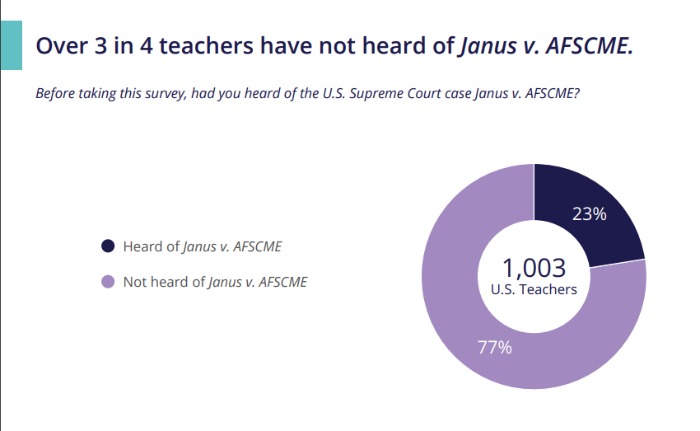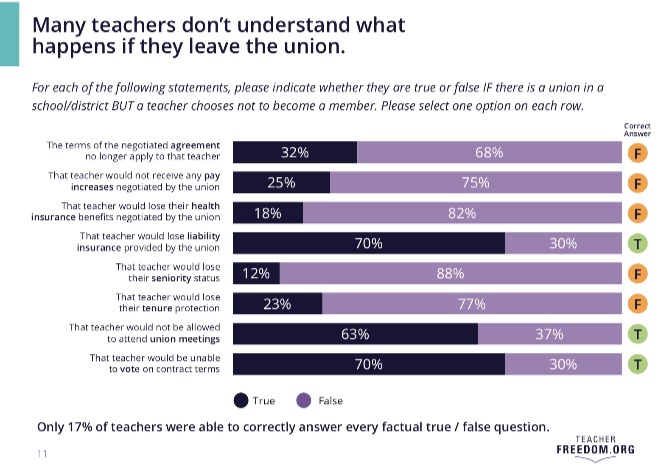A year after the path-changing Janus v. AFSCME decision that freed 5 million American government workers from having to pay union fees, there hasn’t been the exodus of union members that labor pundits and unions expected.
Among such workers, public school teachers constitute the majority—3.1 million. In Pennsylvania, the Pennsylvania State Education Association (PSEA), which has a 180,000-strong membership of current, retired, and student teachers, claims to have lost less than 1 percent, or about 1,000 members (though nearly all of its 6,704 fee payers declined to join).
Now, a new Teacher Freedom poll has revealed that most teachers don’t know they can leave the two main teachers’ unions—NEA and AFT—without penalty.
They found more than three in four teachers still don’t know about the Janus decision, even while they generally support the freedom of association the decision confers. That means states like Pennsylvania still have much work to do in helping teachers understand their rights.

Further, only 48 percent of teachers in the poll were aware of the ruling’s benefit: that teachers who didn’t join or who left a union would no longer have to pay a non-member union fee. In fact, only 4 percent had changed their union membership status at all in the last year. A whopping 82 percent said they were unaware of anyone contacting them about the Janus decision—an argument in favor of pending legislation that would require government agencies to inform employees of their full rights.
The poll demonstrates two other major themes. First, there’s a notable gap between what teachers know of their rights, and how they think union membership should ideally work:
- 74 percent think union membership should be voluntary (10 percent said it should be mandatory, while the rest said they didn’t know).
- Of teachers who had revaluated union membership in the last year, 28 percent said they were more inclined to leave or to never join.
Second, teachers are confused about what happens to their jobs if they do leave a union. As the slide below shows, many think they will lose the pay and benefits their union negotiated if they stop being members. (They won’t).
Most respondents—70 percent—understood correctly that resigning means losing the union’s professional liability insurance, and that’s significant because many teachers are afraid of being sued. Overall, few teachers could answer all the questions below correctly.

The poll’s findings dovetail with what the Pennsylvania worker advocacy group Americans for Fair Treatment has learned through its educator project Free to Teach. Through interactions with teachers statewide, it’s becoming clear that teachers fear losing job security or being “alone” during disputes with administrators. In addition, many educators value and appreciate the work of their local school district union. Even in the national poll, 20 percent of teachers in unionized workplaces said they would prefer being in a local union, independent from the state and national unions.
In Pennsylvania, even when teachers and other government workers want to resign, they are often trapped by narrow exit windows. Such “maintenance of membership” provisions in the state’s Public Employe Relations Act and union contracts mean that if a worker misses the 15-day window to leave at the end of a multi-year contract, they’re simply stuck. Lawmakers need to amend state law to fix this problem, but in the post-Janus interim, many employees have resorted to suing their unions in order to leave.
Teachers and the rest of Pennsylvania’s 330,000 government workers don’t just need to know their rights. They need to understand that several options (like a local-only union) are available to them. And then workers should be able to exercise those rights without union roadblocks—or fear of the unknown.





